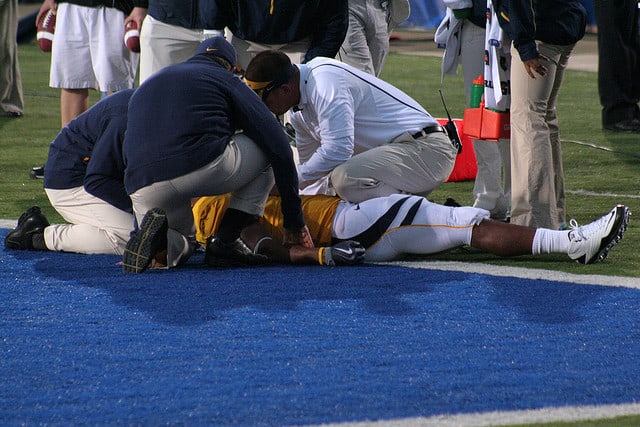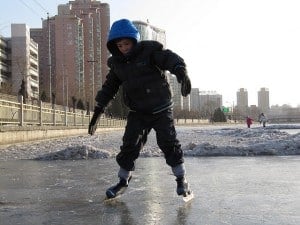Roman gladiators would fight each other to the death (when they weren’t fighting wild beasts). After significant religious matches of the ancient Mayan version of ulama, the losing ulamists (ulamadors?) would often be offered up as human sacrifices. Ancient polo began as a training simulator for the Persian king’s elite cavalry troops… with all the danger that holding a fake horse battle between hundred-man teams entails.
Something about these sports always seemed unreal to me. How could people think a game was worth killing for? Or worth dying for? Surely I knew better than these benighted people.
Or I thought I did. Yet, for most of my life, I have taken football for granted. People who grew up outside the U.S. often told me they thought football was too violent, but I always came right back and explained that that was part of the appeal. In football, violence is taken and blunted, made safe, and turned into a balletic experience. Except… maybe it isn’t?
On October 1st, Tom Cutinella, a 16-year-old high school football player, died after receiving a head injury in a “typical football play.” In itself, this occurrence is tragic. But it turns out that Cutinella was the third high school football player to die in a week (although not all from injuries). And six players died last year. And according to a study by high school and college football organizations, over the 20 years before that, 89 people died as a direct result of football injuries (an average of four and a half per year).
Unexpected perhaps, lamentable certainly, but as the study was quick to point out, this is less than a single death per 100,000 participants. Not exactly the blood-stained sands of the Colosseum. Many worthwhile activities entail some level of risk, but that does not mean that they are not worth doing. Climbing Mt. Everest has claimed many lives throughout the years, and even taking a simple walk through the hills behind my home in Berkeley exposes me to mountain lions. Maybe these football deaths are regrettable outliers, the kind of aberration that we seek to prevent but don’t allow to rule our lives.
Yet in the case of football, the problem may lie closer to its heart than even these deaths suggest. Yes, a football fatality is a statistical outlier, but violence and trauma are not. Blows to the head are even more certain for a football player than a chop to the head was for a Mayan ulama player. I used to shrug off player concussions. But two years ago, I had one myself.
An exuberant attempt at a high-speed hockey stop while ice-skating brought me crashing to the earth. I got back up, felt fine, and continued skating. Only a couple hours later did I begin to have a headache and wonder what I had done to myself. Pain and nausea continued for two weeks, and for several months after that I felt disoriented if I moved my head too rapidly. It took six months before I took for granted again my ability to make sharp turns while walking, much less even attempting a contact sport.
Most scary of all, though, was the personality change. We like to think of our consciousness as uniquely ours, something no one can take away from us or alter. But during that first week after the concussion, I felt different. I don’t mean I had different, new sensations. I mean that what it felt like to be me—to be Chris—was different. I couldn’t bring myself to care about things that used to be important to me, and I found myself prone to saying things I never would have let slip normally. (Apologies to all who may have received an unexpectedly barbed comment from me in May of 2012). I was terrified that my sense of self could be so quickly altered without my consent, without any direct choice on my part in the matter, all as the result of one—one—hit to the head.
So when football concussions began to show up in the headlines last year, I took note. Feelings of vague guilt wrestled with a lifetime of affectionate fandom. I boycotted, and I broke boycotts in quick succession. (As of this writing, I am football free for the entirety of the 2014 season, but I am pretty realistic about the likelihood that I will be chowing nachos with the rest of America on Superbowl Sunday.) I doubt my waffling, uncertain answer to the question of “To watch or not to watch?” is any more insightful or authoritative than that of any other person.
Perhaps more important than all that attention to Where I Stand,1 though, is that my experience has given me great sympathy for those retired players who retired from the game they dedicated their life to, only to discover that they were no longer themselves, experiencing depression, memory loss, and increased aggression. Regardless of how we answer the football question, they deserve our attention and our care. After all, not only have they risked extraordinary injury, they have raised the question of what our descendants might think of us 2,000 years from now.
- That fueler of internet controversy and smug self-righteousness the world over. ↩




